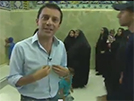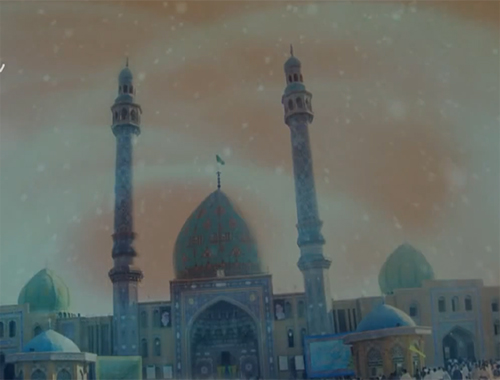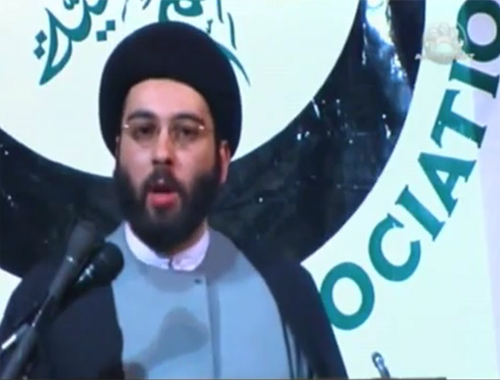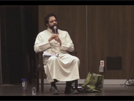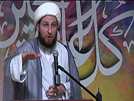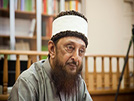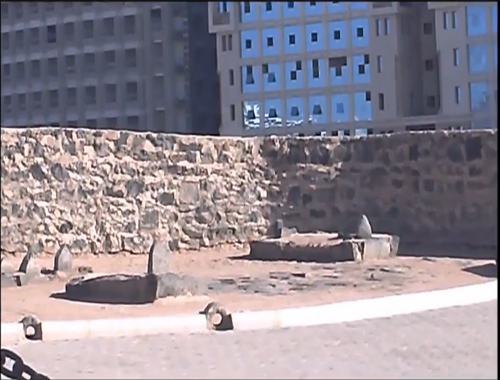Verses 1-5
- Details
- Hits: 2692
Sura Fajr
(Break of Dawn)
No.89 (Verses 1-5)
بِسْمِ اللّهِ الرَّحْمَنِ الرَّحِيمِ
(1) وَالْفَجْرِ
(2)وَلَيَالٍ عَشْرٍ
(3)وَالشَّفْعِ وَالْوَتْرِ
(4)وَاللَّيْلِ إِذَا يَسْرِ
(5)هَلْ فِي ذَلِكَ قَسَمٌ لِّذِي حِجْرٍ
In The name of Allah, The BenefIcent, The Merciful
1. "By the Break of Dawn,"
2. "And the Ten Nights;"
3. "By the Even and the Odd;"
4. "And by the Night when it departs;"
5. "Is there (not) in this an oath for those who have sense?"
Commentaty:
An Oath to the Dawn!
There are five awakening oaths at the beginning of the Sura. At first, it says:
"By the Break of Dawn,"
* * * *
"And the Ten Nights;"
The term /fajr/ originally means 'break open', and since the light of the dawn breaks the gloom of night it is called /fajr/.
We know that the meaning of /fajr/ is twofold: (1) /fajr-i-kathib/ 'the faLse dawn' which rises without extending laterally and appears to be black, presenting itself like an obstacle on the horizon, and is compared to the tail of a Fox whose narrow end is onto the horizon and its conical shaped end is in the mid-sky, (2) /fajr-i-sadiq/ 'the true dawn' and is like a stream with white water that becomes visible, rising, filling the horizon with its whiteness and, thereafter, spreads throughout the sky with a special brightness by which the night ends and the day begins.
It is the time when everything by which fasting would be broken becomes unlawful to the faster, and when the morning prayer can, then, be performed.
Some commentators have carried the term /fajr/, in this verse, to its absolute meaning, that is; whiteness, which is certainly one of the signs of ALLah' Greatness. It is a reference point in the lives of human beings and all earthly creatures, and the prime glory of the victorious light and the end of faded darkness when the calm sleep ends and the movement of living creatures begins. It is for this very life that ALLah swears by it.
However, some commentators have said that it means 'break of dawn at the beginning of Muharram'.
Still, others have commented on it as meaning 'break of dawn at the day of the Feast of Sacrifice' where the important rituals of the pilgrimage to Mecca are fulfilled and it follows close to the Ten Nights. Finally, there are some who have commented on it as meaning 'break of dawn for the month of Ramadan', or 'break of dawn on Fridays'.
All in all, the verse has such a broad meaning which involves all the above commentaries, though some of its examples are more clear and more important than the others.
Some have considered its meaning even beyond this and have said that the objective point for the term 'break of dawn' is 'any light that glitters in the dark'.
Therefore, the glitter of the light of Islam and Mohammad (p.b.u.h.) in the gloom of ignorance,at that time, is one of the examples of /fajr/ 'break of dawn'. Also, the glitter of the break of dawn for the Rise of Hazrat Mahdi (the twelfth Imam) (p.b.u.h.), when the world will be completely darkened by corruption, transgression and injustice, is considered to be another example of this. (1)
The rise of Imam Hosain on the bloody plains of Karbala. is another example, when he pulled back the black curtains of deceit revealing the tyrannies of the Ummayides and unveiling the real face and nature of those devils.
Furthermore, all the true revolutions that have occurred in the history of the world, against disbelief, ignorance, transgression and cruelty are, also, examples of /fajr/.
Even the first light of wakefulness that appears in the darkened hearts of sinners and makes them move to repent, is /fajr/ 'break of dawn '. Of course, this is an expansion on the concept of the verse, while the apparent meaning of the verse has the same meaning /fajr/ with the sense of 'the break of dawn'.
The oath 'By the Ten Nights' is generally understood to be the first ten nights of Zul-Hajj; nights which are witness to the largest and most devoted gathering of Muslims in the world, and this is an idea which is narrated by Jabir-ibn-'Abdillah in a tradition from the Prophet (p.b.u.h.). (2)
Some have also commented on them to mean 'the last ten nights of Ramadan' in which the nights of /qadr/, (when the Qur'an was revealed) are hidden.
Some have meant 'the Ten Nights' to be the first ten nights of Muharram; the first Arabic lunar month.
It is also possible to combine these three commentaries together.
Some narrations, containing the hidden meanings of the Qur'an, say that /fajr/ refers to the existence of Imam Mahdi (p.b.u.h.), and /layalin-'ashr/ 'ten nights' refers to the ten sinless Imams who came before him (p.b.u.th.) , and /shaf'/ 'even' refers to Hazrat Ali and Fatimah Zahra (p.b.u.th) the latter term is mentioned in the next verse.
In any event, the oath to these ten nights is an evidence of their great importance since oaths are always made to very important things.
* * * *
"By the Even and the Odd."
Commentators have cited many different meanings for the terms /shaf'/ and /watr/ 'even and odd' mentioned in this verse. Some of them have given twenty meanings, (3) while some others have gone further and narrated over thirty-six meanings. (4)
The following are the most important ones:
1. The objective point, here, is the 'even' and 'odd' numbers. According to this commentary, ALLah has sworn by all even and odd numbers. They are figures around which all calculations and regularities revolve, and cover the existing universe. It seems as if He had said: 'By the regulation and calculation'. In fact, in the world of existence the most important things are regularity, calculation and numbers which shape the main foundation of Man's life.
2. The objective meaning of /shaf'/ is 'creatures', because they are all in pairs, and the objective point of /watr/ 'odd' is 'ALLah', who is unique and has no equal. In addition, created things are all combined by substance and existence which, in philosophy, are called 'combined pairs '. The only infinite entity, which is non-material, is ALLah. (This meaning has been used in some narrations from the sinless Imams). (5)
3. The objective idea of 'even and odd' is that all the creatures of the world, in one respect or another, are either 'even' or 'odd'.
4. The meaning refers to prayers, some of which are 'even' from the point of the number of 'rak'at', and some are 'odd'. (This idea has been narrated from the sinless Imams (p.b.u.th.), too.) Or it means the elective prayers of 'Shaft' (two rak'ats) and 'Watr' (one rak'at) at the end of 'the night prayers'.
5. The meaning of /shaf'/ is the day of /tarwiyah/ (the eighth day of Zul-Hajj when the pilgrims, in Mecca, travel to 'Arafat), and /watr/ is the 'Arafah Day, when the pilgrims in Mecca remain at 'Arafat. Or /'shaf'/ is the day of the 'Feast of Sacnfice' (the tenth of Zul-Hajj) and /watr/ is the day of 'Arafah. (This commentary is also mentinned in narrations from the sinless Imams).
The main thing is that if the Arabic sign /al/,in these two terms, is used in general, all the above meanings can be applied, as each of these commentaries indicates only one example from the given examples of /shaf'/ 'even' and /watr/ 'odd'. Mentioning each of them does not mean that it is the exclusive interpretation, but that it is one clear example among the rest.
However, if /al/ refers to a particular even and odd number, here, concerning the former oaths, two meanings are the most appropriate. The first is that the objective point is the day of the 'Feast ofSacnflce' and the day of 'Arafah', which corresponds with the first ten nights ofZul- Hajj, and the most important pilgrimage rituals are practised, then. Or, pertaining to the oath 'By the break of Dawn'; the objective point is concerning the prayers which are said at the end of the night and before the break of day, which is the most suitable time for praying and supplicating to Allah; particulary when both of the commentaries are mentioned in the narrations cited from the sinless Imams (p.b.u.th.).
* * * *
For the final oath in this group, it says:
"And by the Night when it departs."
What an interesting concept! The movement of the night is in relation to night, itself, (the term /yasr/ based on /sura/ 'to walk at night' here, is written as an analogy instead of /yasri/ due to the pause at the end of the verse) as if 'night' were a living creature with senses and movement and travelled in the darkness, by itself, moving toward a bright dawn.
Yes, the oath is taken to the darkness which moves to the light; a moving darkness, not a stationary one. Darkness is frightening when it becomes fixed and immobile, but when there is movement unto the light, it becomes valuable.
Some people have said that the gloom of night is moving over the face of the earth and, basically, it is that very moving night which is useful and livable, that is, night alternates continuously with day. So.if night stopped permanently on one half of the globe, both the dark and the sunlit halves would die.
What does 'Night' mean here? Does it mean every night or is it a special definite night? Again, there is no agreement among the commentators. If /al/, the Arabic definite article, is used in a general sense, it refers to all the nights, which, itself, is a blessing from the gifts of Allah and is a phenomenon from the great phenomena of creation.
Although, if it refers to a definite night, relating to the previous oaths, it means the night before 'the Feast of Sacrifice' when the pilgrims of Mecca go from 'Arafat to the Sacred Monument, /muzdalafah/, and, spending the night in that sacred place, go toward Mina at sunrise. (This commentary is also cited in some narrations from the Siuless Ones).
Those who, themselves, have seen the view of 'Arafat and the Sacred Monument, at night, know how thousands and thousands of people move here and there in the same way and feel that night, with all its entity, is moving. The pilgrims, in reality, do move here and there, but the movement of night is so vast that it seems the whole world, heavens and earth are moving. This condition is felt only when a person, himself, visits the place on the night before 'the Feast of Sacrifice' and sees, with his own eyes, the exact meaning of this verse:
"And by the night when it departs."
In any case, night, with either meaning it has (general or definite), is one sign among the many signs of the Divine Dignity, and is one of the very important factors in the existing world. It moderates the temperature of the weather. It gives calmness to every creature, and prepares a still and quiet atmosphere for worship and supplication to Allah. The night before 'the Feast of Sacrifice', which is called 'the gathering night', is also one of the most wonderful nights of the year at the Sacred Monument, /muzdalafah/.
Furthermore, if these five items (the oath by break of dawn, the Ten Nights, Even, Odd, Night when it departs) can be considered as relating to the specific days of Zul-Hajj and the great rituals of Hajj, their relationship will be clear.
And, if it is not clear yet, a collection of great events of the divine creation and divine religious rituals are pointed out, which are signs of the Dignity of Allah and are a wonderful phenomenon in the existing world.
After expressing these meaningful awakening statements, it says:
"Is there (not) in this an oath for those who have sense?"
The term /hijr/, here, means 'sense understanding' and originally means 'anything forbidden', for instance, it is said: 'The judge forbade him to use his wealth'. A skirt is also called /hijr/, meaning protection and forbidding others entrance, and since /'aql/, 'wisdom' isdom 'also forbids man from doing wrong deeds it has been rendered /hijr/ The word /'aql/, itself, means 'keeping back'; therefore, the rope with which the leg of a camel is hobbled is called /'iqal/.
What are these oaths for? There are two possibilities. The first is that they are for the sentence of verse 14: "Surely your Lord is ever watchful".
The second is that what they are for is not mentioned, but means that they are about the punishment of the wrong doers. The meaning may be found in verse 13, in that, a scorge of diverse chastisement will be poured on the unbelievers and transgressors. In this way, the oaths and what they are for can be made clear.
(1) Borhan Commentary, vol.4, p. 457, Tradition 1, narrated from Imam Sadiq (p.h.u.h.).
(2) Abulfutukh Razi, Commentary, vol. 12, p. 74.
(3) Fakri-i-Razi commentary vol. 31 p. 164.
(4) al-Mizan, 'Allamah Tabatabaie Commentary, vol.20, p.406, Ruh-aI-Ma'ali, al-Tahrir wat-Tahayyur Commentary, vol.30, p. 120.
(5) Majma'-al-Bayan, vol. 10, p.405 narrated by Abusa'id Khidry from the Prophet (p.b.u.h.).


